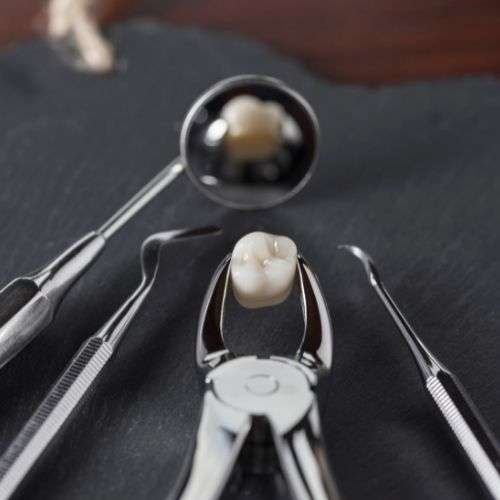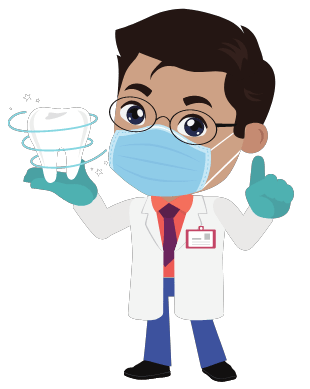A tooth that has fully erupted through the gum line can usually be removed as easily as any other tooth via a regular extraction.
A wisdom tooth or other tooth that is impacted or is still under the gum line or embedded in the jaw bone may require a surgical extraction, which is a form of oral surgery. A surgical extraction means your dentist will make an incision along your gum line to expose the tooth, and remove any bone that is still covering the tooth to allow it to be removed. Your dental insurance may cover all or a portion of surgical tooth extractions.
Your dentist may recommend extracting one tooth at a time or focusing on one area of your mouth at a time. Before the dentist removes the tooth, he will numb the surrounding tissue with a local anesthetic.
If you or a loved one have experienced dental anxiety in the past, your dentist may utilize Nitrous Oxide, known as laughing gas during the procedure, or may have prescribed an oral sedative to help you relax.
Once the area has been numbed, the dentist will remove the tooth, control any bleeding, and if necessary, may use sutures (stitches) to close the gums. Your dentist may prescribe or recommend over-the-counter medications to help control any post-procedure pain or swelling.
Wisdom teeth do not always have to cause you pain to cause future problems. The movement of surrounding teeth caused by wisdom teeth is often slow, and may not cause any pain. However, if you or a loved one have had braces or other orthodontic treatment, crowding from wisdom teeth can potentially un-do that work, resulting in crooked and misaligned teeth and jaws, as well as wisdom teeth pain.
Your dentist will review your x-rays and the positioning of your wisdom teeth at your regular checkup visits. He may recommend removing some or all of your wisdom teeth to help alleviate any pain, swelling, or infection you may currently have, or to avoid future problems. Additionally, your dentist may recommend removing wisdom teeth earlier rather than later, because future extractions may become more painful or complicated, or even result in a dental emergency.
Your dentist will determine the position of your wisdom teeth and determine the type of extraction to be performed. In most cases, your Glance Dental dentist can remove your wisdom teeth right in the office. Occasionally, however, he may refer a patient with a special case to an oral surgeon for an evaluation.
The tooth extraction procedure and recovery for pediatric patients are very similar to that of adults. In some cases, Nitrous Oxide may be used to help a child to feel more relaxed during the procedure. In this case, your child should not eat for 2 hours prior to the procedure.
Sometimes, orthodontic treatment is needed to facilitate other dental procedures such as crowns, veneers, and implants. Also, certain orthodontic problems require collaboration with oral surgeons (for example: to expose impacted teeth or correct severe bite problems and facial deformities). Our dentists and orthodontic specialists use this team-based approach as a part of our comprehensive suite of treatment services.
The cost of tooth extraction will vary depending upon a variety of factors, including the type of dental extraction needed. Prior to your procedure, your dentist will review what treatment is needed, and our staff will provide you with information about any fees associated with the procedure, as well as options available to help make sure you receive the dental care you need in a way that fits into your budget.
If you have dental insurance, your coverage often includes preventative care including regular exams and x-rays. It is important to stay up to date with your insurance coverage. Our staff is happy to review your coverage with you to ensure you are maximizing your insurance benefits while minimizing any out-of-pocket expenses.
It is very important for patients to follow the dentist's post-procedure recovery instructions, which include avoiding smoking, chewing hard or tough foods, and strenuous physical activity for a period of time to allow the gums and jaw to heal.
If Nitrous Oxide or local anesthetic only was used during the extraction, you will be able to drive yourself home if you'd like. If a prescription sedative or anti-anxiety medication was used, you will need to have a friend drive you home. After an extraction, some pain and swelling can be expected for a while. Your dentist will tell you what you might expect and also let you know when it may be a good idea to call the office to report if you are experiencing any problems beyond what is normally expected, such as bleeding or a dry socket.
Once the healing process is complete, people who have had tooth extractions can typically get right back to life as usual.

